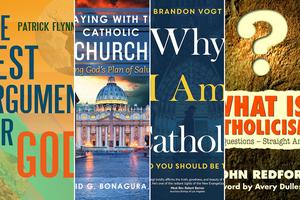A Millennial’s Perspective on Pope Francis and the Church
COMMENTARY: Mistrustful of both individuals and institutions alike, Millennials find meaning from an unlikely source.

Earlier this year, the Pew Foundation released the results of a major new study on “Millennials in Adulthood.” It found that the Millennials, my generation, are: less religious than other generations (29% have no religious affiliation at all); financially more burdened, though more optimistic than other generations; and less trusting of both individuals and institutions (only 19% believe that most people can be trusted).
Writing in The Atlantic, Derek Thompson analyzed Pew’s report by summing up Millennials as “deeply contradictory.” Upon first consideration, then, it might seem odd that Pope Francis is widely popular among this cohort. Upon further review, however, it makes perfect sense.
By the end of 2013, Pope Francis was the No. 1 trending topic on Facebook. His widespread popularity has landed him on the covers of Time and Rolling Stone, and a Wall Street Journal poll found that only 7% of those surveyed expressed a negative view of the Pope — an unprecedented public-relations accomplishment for the Catholic Church in recent years.
How is it that Pope Francis, the leader of an institution as old and as frequently criticized as the Catholic Church, is attracting such widespread hype and attention from a generation so inclined to distrust both institutions and individuals alike? Why might a generation that is naturally skeptical of religion find faith in Pope Francis?
Simply put, Pope Francis is pointing Catholics, and the rest of the world, to the Gospel, a manual for what it’s like to live in contradiction to the world around us — something we Millennials are quite comfortable doing. Where else can one find such teachings as: “Do not store up for yourselves treasures on earth” or “Whoever takes away what is yours, do not demand it back.”
I would summarize Pope Francis’ chief message during the first year of his pontificate as a message of mercy — something that’s too seldom discussed but particularly craved by Millennials. Contrary to media distortion, neither Pope Francis nor the recent Extraordinary Synod of Bishops on the Family has altered a lot of Church teaching; nor is it likely that he will. Instead, he’s reminded us that in order to understand the Church’s teachings — particularly the harder teachings so frequently cited, like our opposition to abortion and the redefinition of marriage — we must lead with more than a mere message of love, but with a lived out expression of love as well.
The Church has suffered decades of declines in Mass attendance and seminary enrollment and a negative image in the general public’s perception, which is largely attributed to the worldwide effect of the sexual-abuse scandals. Thus, it might be surprising to discover that, according to the Vatican’s Central Office of Church Statistics, there has been an increase of more than 5,000 Catholic priests globally during the first decade of the 21st century. In the United States, seminary enrollment in the past decade has reached a 20-year high. While the teachings of the Catholic faith seem countercultural, young people are looking more now than ever to be given something to believe in.
Our generation has been shaped by the events of Sept. 11, 2001, the wars in Afghanistan and Iraq, the devastating effects of natural disasters such as Hurricane Katrina and the 2004 tsunami that wreaked havoc on Thailand and Indonesia, as well as the awful acts of violence witnessed in Columbine, Aurora, Newtown and elsewhere.
Seeking stability in a world that seems to be changing so dramatically, many of us — including converts like myself — are finding answers in the Church and her teachings. We are not anxious to change these teachings, and, unlike our parents’ generation, we are not involved in perpetuating a power struggle with our priests and bishops. The political gridlock of the world around us has soured us to such divisions, causing us to have little interest in continuing such conflict within our churches.
From the 3.2 million young people who flocked to the beaches of Rio de Janeiro for World Youth Day in July 2013, and the tens of thousands that fill St. Peter’s Square on a weekly basis to see Pope Francis, there’s more than simply the appeal of witnessing firsthand the world’s most-watched figure. High above the crowd, from the balcony of the papal apartment, Francis is directing our attention to a higher source of inspiration.
Below on the ground, in the trenches of society, we Millennials hear Christ’s message, “Blessed are the merciful, for they shall be shown mercy.” The deeply contradictory spirit that has defined my generation is now being given a lived-out expression of love and mercy in the most unlikely of places: the world’s oldest institution.
Christopher White is the co-author of
Renewal: How a New Generation of Faithful Priests
and Bishops Is Revitalizing the Catholic Church (Encounter Books, 2013).
This commentary was adapted from a keynote address White gave
at the gala celebrating the 10th anniversary of Catholic Response magazine.
- Keywords:
- apologetics
- catholic church
- catholic faith
- catholic response magazine
- christopher white
- generation y
- millennials
- pope francis
















